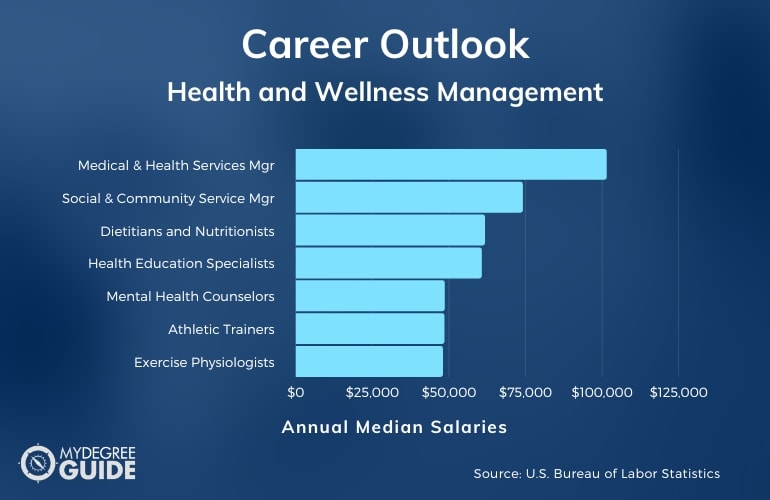If you are interested in helping others on their health and wellness journey, you might consider pursuing a masters in health and wellness.

You may have the opportunity to help others through coaching, various educational opportunities, or making improvements on a larger scale through management. In addition to health and wellness-specific skills, this masters program can help develop your coaching, management, leadership, and business skills.
Editorial Listing ShortCode:
Professionals with a masters in health and wellness have many career opportunities available to them in a field that is expected to continue growing in demand.
Universities Offering Online Masters in Health and Wellness Degree Programs
Methodology: The following school list is in alphabetical order. To be included, a college or university must be regionally accredited and offer degree programs online or in a hybrid format.
American College of Education
American College of Education offers an MEd in Health and Wellness. The program is offered fully online and can potentially be completed in 15 months. There are 11 start dates offered throughout the year. To graduate, students must complete 31 credits including a capstone project. Each course is 5 weeks long.
American College of Education is accredited by the Higher Learning Commission.
Benedictine University
Benedictine University offers an MS in Nutrition and Wellness. The program is offered online and on campus. Students may choose between concentrations in Health Education and Promotion or Nutrition Entrepreneurship. The program can potentially be finished in 18 to 24 months, even when taking one course per term. It requires the completion of 33 credit hours.
Benedictine University is accredited by the Higher Learning Commission.
Creighton University
Creighton University offers an MS in Integrative Health and Wellness. Students can complete the program entirely online and may set their own pace. Students may choose one of two concentrations: Health and Wellness Coaching or Healthy Aging. Both concentrations require the completion of 36 credits. Classes are offered five times per year. Potential courses include Exercise for Chronic Disease.
Creighton University is accredited by the Higher Learning Commission.
Grand Canyon University
Grand Canyon University offers an MS in Mental Health and Wellness. The program is offered fully online, and courses are asynchronous. To graduate, students must complete 34 credit hours. Most courses are offered in an 8-week, accelerated format. The program does not prepare students for clinical licensure. Potential courses include Ethics and Cultural Diversity in Mental Health and Wellness.
Grand Canyon University is accredited by the Higher Learning Commission.
Liberty University
Best Colleges named Liberty University one of the best universities for an online masters in counseling program. Liberty offers an MA in Human Services Counseling—Health and Wellness. The program is based on a Christian worldview. Students can potentially complete the program in 12 months. Each class is 8 weeks long.
Liberty University is accredited by the Southern Association of Colleges and Schools Commission on Colleges.
Maryland University of Integrative Health
The Maryland University of Integrative Health offers an MA in Health and Wellness Coaching. The program can be completed fully online or in a hybrid format. Courses are taken in trimesters, but students must begin in the fall or spring. The program requires the completion of 30 credits and can potentially be finished in just 20 months.
MUIH is accredited by the Middle States Commission on Higher Education.
Merrimack College
Merrimack College offers an MA in Health and Wellness Management. The program is offered online, on-campus, or in a hybrid format. The program can potentially be completed in 9 to 12 months. Classes are offered four times per year. Students in the program are offered several fellowship options to pursue.
Merrimack College is accredited by the New England Commission of Higher
Montreat College
Montreat College offers an online program for an MA in Mental Health and Wellness. The program is offered fully online through the School of Adult and Graduate Studies. Courses are 8 weeks long, and there are two terms offered each semester. Potential courses include Counseling Across the Lifespan and Career Counseling.
Montreat College is accredited by the Southern Association of Colleges and Schools Commission on Colleges.
Nebraska Methodist College
Nebraska Methodist Community College offers an MS in Wellness and Health Promotion Management that can be earned online. The program offers two concentrations: Worksite and Community Wellness or Medical Fitness Management. The program requires the completion of 36 credit hours and can potentially be finished in 21 months. Courses are offered in 5 and 10-week formats.
Nebraska Methodist College is accredited by the Higher Learning Commission.
Rowan University
Rowan University offers a fully online program for an MA in Wellness and Lifestyle Management. The program is made up of ten courses for a total of 30 credits. Courses are offered in 8-week modules, and there are several start dates throughout the year. For the final course, students can choose between a capstone project, an internship, or a practicum.
Rowan University is accredited by the Middle States Commission on Higher Education.
State University of New York – Plattsburgh
The State University of New York—Plattsburgh offers an MS in Fitness and Wellness Leadership that can be earned fully online. The program requires the completion of 10 to 13 classes and can potentially be finished in just 12 months when taken full-time. Courses begin in fall, winter, spring, and summer.
SUNY Plattsburgh is accredited by the Middle States Commission on Higher Education.
Tulane University
Tulane University offers an MS in Health and Wellness Management. While many courses are available online, some must be completed during the evening or on weekends on campus. The program requires the completion of 33 credits, and students may customize their education with electives. To graduate, students must also complete an internship.
Tulane University is accredited by the Southern Association of Colleges and Schools Commission on Colleges.
Union Institute & University
Union Institute & University offers an MA in Health and Wellness. The program is available fully online with opportunities for one-on-one instruction. The program requires the completion of 36 credits and can potentially be finished in just 16 months when attended full-time. Classes begin in January, May, and August. Students may customize their education to their career goals.
Union Institute & University is accredited by the Higher Learning Commission.
University of Cincinnati
The University of Cincinnati offers an MS in Health and Wellness Management. The program is available fully online with both synchronous and asynchronous courses. Students must complete 30 credit hours to graduate. The program is offered three times each year. The curriculum is designed to prepare students for the Certified Wellness Practitioner examination.
The University of Cincinnati is accredited by the Higher Learning Commission.
University of Minnesota – Twin Cities
The University of Minnesota—Twin Cities offers an MA in Integrative Health and Wellbeing Coaching. The program is mostly online, but students must attend two-weekend intensives, one in the fall and one in the spring. To graduate, students must complete 30 credits and an internship. They may choose electives to customize their degrees.
The University of Minnesota – Twin Cities is accredited by the Higher Learning Commission.
University of Pittsburgh
The University of Pittsburgh offers an MS in Health and Wellness Management. Many of the courses are offered online or in a hybrid format. The program starts each fall and can potentially be finished in 18 to 24 months. To graduate, students must take a comprehensive exam and score 80%. Applicants to the program must submit GRE scores.
The University of Pittsburgh is accredited by the Middle States Commission on Higher Education.
University of West Florida
The University of West Florida offers an MS in Health Promotion and Worksite Wellness. The program is fully online. It requires the completion of 39 credit hours and can potentially be finished in 2 years. Each course is 16 weeks long. Students may pursue an optional thesis track.
The University of West Florida is accredited by the Southern Association of Colleges and Schools Commission on Colleges.
University of West Georgia
Students at the University of West Georgia can earn an MS in Integrative Health and Wellness entirely online. The program requires the completion of ten courses for a total of 30 credit hours. Students may choose between a Health and Wellness Coaching concentration or a Lifestyle Medicine and Integration concentration.
The University of West Georgia is accredited by the Southern Association of Colleges and Schools Commission on Colleges.
University of Wisconsin – Stevens Point
The University of Wisconsin—Stevens Point offers an MS in Health and Wellness Management. The program may be completed entirely online or on campus. It requires the completion of 12 courses for a total of 36 credits. Courses are asynchronous but have regular deadlines. To graduate, students must also complete a capstone project with a local organization.
UW-Stevens Point is accredited by the Higher Learning Commission.
Wayne State College
Wayne State College offers a Master of Science in Organizational Management in Human Performance and Wellness Management. Students may complete the program entirely online.
The program requires the completion of 36 credit hours. The curriculum is designed to prepare students for several types of certifications. Potential courses include Advanced Exercise Physiology. To graduate, students must complete a thesis, project, or internship.
Wayne State College is accredited by the Higher Learning Commission.
Online Masters in Health and Wellness Programs

Pursuing a masters in health and wellness can open up numerous career paths for you to explore. Many master-level programs combine business and management courses alongside health and wellness courses.
Topics covered in health and wellness masters programs might include:
- Programming and application of health and wellness strategies
- Legal and ethical principles in health and wellness
- Leadership and management skills
- Research methods
- Health systems and policies for managers
- Principles of behavior change
- Effects of exercise and nutrition on health
- Health and wellness coaching
In addition, you may also study the psychology of behavior and behavior change, which could be helpful if you’re coaching clients to overcome obstacles and reach their goals. Graduates may seek opportunities to provide individual or group wellness coaching.
Private practices, hospitals, community health clinics, schools, and fitness and wellness centers are just a few of the places that employ health and wellness professionals. Many businesses now provide their employees with wellness practices, including yoga, nutrition education, and fitness classes. Health and wellness graduates can also pursue employment opportunities in these corporate settings.
Individuals with a combination of health, wellness, management, leadership, and business skills may consider of range of career paths, depending on their specialty. Many graduate-degree holders pursue senior or leadership roles in the field.
Health and Wellness Management Careers & Salaries

There are a number of employment opportunities that you might pursue with a masters in health and wellness. If you are already working in a related field, a masters-level education might help you advance in your current career.
There are also various ways to serve your community and use your knowledge and skills in health education or wellness coaching. According to the Bureau of Labor Statistics, here are the median salaries of some potential career paths related to health and wellness.
| Careers | Annual Median Salaries |
| Medical and Health Services Managers | $101,340 |
| Social and Community Service Managers | $74,000 |
| Dietitians and Nutritionists | $61,650 |
| Health Education Specialists | $60,600 |
| Substance Abuse, Behavioral Disorder, and Mental Health Counselors | $48,520 |
| Athletic Trainers | $48,420 |
| Exercise Physiologists | $47,940 |
| Recreational Therapists | $47,940 |
| Community Health Workers | $46,590 |
| Fitness Trainers and Instructors | $40,700 |
Careers in health and wellness tend to pay higher than average salaries, with many careers expected to see steady growth over the next ten years.
If you are interested in education, you may pursue opportunities to teach at the high school or community college level. Health education specialists and wellness coaches can also be found in community and healthcare settings. Many graduates pursue individual or group coaching, allowing them to work with clients on their goals and craft specific plans to meet their needs.
Experienced professionals may pursue senior or leadership opportunities in the field. A masters degree could help you advance your professional and leadership qualifications.
Health and Wellness Master’s Curriculum & Courses

While individual courses will vary from program to program, below are some examples of courses you may find included in health and wellness masters programs:
- Foundations of Health Lifestyles: You’ll learn key wellness concepts, including nutrition, physical activity, mindfulness, risk factors, and managing chronic illness.
- Leadership in Health and Wellness Professions: This course focuses on understanding leadership theories and helps you develop your leadership skills.
- Applied Healing Strategies: In this course, you’ll apply your skills and knowledge in an individual practicum setting with clients.
- Health Systems and Policy: You’ll examine how the US healthcare system impacts wellness programs, including insurance and healthcare providers.
- Health and Wellness Intervention Strategies: In this course, you’ll focus on the process of assessing clients and developing and implementing wellness programs.
- Theories and Principles of Behavior Change: This course provides you with a psychological and motivational framework for coaching clients through behavior change.
- Exercise and Nutrition in Health Disease: In this course, you’ll examine the effects of nutrition and exercise at every stage of the life cycle, focusing on the effects of both in preventing, managing, and treating chronic conditions.
- Fundamentals of Health and Wellness Coaching: This course helps you build coaching skills, including observing, active listening, questioning, and goal-setting.
- Legal and Ethical Principles of Wellness Management: You’ll examine healthcare regulations and the professional implications of the law in wellness coaching.
- Professional Development for Health and Wellness Coaches: In this course, you’ll create a professional development action plan to continue developing your professional coaching skills.
In addition to these courses, some programs may include practicum courses that allow you to practice your coaching skills in individual and group settings.
Pros and Cons of a Masters in Health and Wellness

As you consider whether this degree is right for you, it’s helpful to understand the pros and cons associated with earning a masters in health and wellness.
Pros:
- Advancement opportunities. A masters often helps you advance your qualifications for administration and leadership positions.
- Higher earning potential. Graduate-degree holders often earn higher salaries in the field.
- Numerous career options. Earning a masters could expand your career opportunities in the field.
- Growing career field. Careers in this field are growing, with continued growth expected.
- Flexibility in bachelor’s requirements. Your undergraduate degree likely does not have to be in a related field.
Cons:
- Additional certification or licensure. Some health and wellness positions require you to gain certification or licensure to practice in your state.
- Relevant work experience often needed. Students with a degree but no relevant work experience have more difficulty finding employment.
- May not be necessary for work. Holding a bachelors degree is sufficient for many health and wellness careers.
- Financial cost. Earning a graduate degree requires extra financial expense.
- Time and energy commitment. Earning a masters degree and completing graduate courses is a commitment, so you might consider the logistics of fitting this into your schedule.
You might consider these different factors as you determine your next steps in your professional journey.
Admissions Requirements

While admissions requirements can vary among schools, below are some common requirements for health and wellness masters programs:
- Bachelor’s degree. Some programs may prefer applicants to have an undergraduate degree in a related field.
- Resume. You may be required to submit a resume with your education and work experience.
- Transcripts. You’ll send in official transcripts from your undergraduate courses.
- Statement of intent. Your letter of intent can outline your professional goals and how the school’s program fits into those goals.
In addition to the requirements listed above, you may be required to submit an online application and pay an application fee.
Accreditation

The process of ensuring that a school and its courses meet a predetermined standard of quality is known as accreditation. The most widely accepted type of accreditation is regional accreditation.
Many employers seek or prefer applicants with degrees from regionally accredited schools. Plus, some professional certifications or licenses may only be available to those who have obtained an education from a regionally accredited institution.
The accreditation status of your school may also affect your educational opportunities. If you choose to pursue a doctorate, most programs may only accept applicants with a masters from an accredited school.
Health and Wellness Licensure and Certifications

There are several certifications you can pursue to and set yourself apart as a certified wellness professional.
- National Board-Certified Health and Wellness Coach (NBHWC): This nationally recognized certification demonstrates that you’ve achieved a predetermined standard of coaching skills and knowledge.
- International Coach Federation, Associate Certified Coach (ICF ACC): This certification demonstrates your credibility as a health and wellness coach and provides the foundation for additional advanced ICF credentials.
- International Coach Federation, Master Certified Coach (ICF MCC): This credential places you within the highest level of coaching certification in the IFC.
Earning an NBHWC or ICF certification can help provide credibility to your coaching skills.
Financial Aid and Scholarships

As you look into health and wellness graduate programs, you can also explore available resources for financial assistance. If you are currently employed in a health and wellness field, your employer may offer financial benefits and incentives to help you further your education.
There may also be funding available through state and federal loans or grants. You can also explore work-study programs that allow you to work part-time to help you pay for your program. You can visit the Federal Student Aid website to learn more about need-based aid from the federal government.
In addition, you can also explore scholarship opportunities that are offered through various public and private institutions, such as universities or professional organizations.
Is Health and Wellness Coaching a Good Career?

Yes, health and wellness coaching is a good career for many professionals. In this profession, you could help others on their health and wellness journey in various settings.
These professionals tend to find employment in private practices, community wellness centers, hospitals, or other healthcare facilities. Some even develop their own private coaching practice. Coaches who pursue opening their own practice may have flexibility in choosing their schedules, rates, and clients.
According to the Bureau of Labor Statistics, careers in this field pay higher than average salaries, with continued growth expected over the next ten years.
What Is a Health and Wellness Master’s Degree?

A health and wellness master’s degree is a graduate program that helps students build their skills in business, management, leadership, psychology, research, and policy within the health and wellness field.
These skills position health and wellness professionals to pursue a number of careers that best align with their individual goals. These goals can include using their knowledge for coaching, education, business and management, or healthcare administration, to name a few.
In this program, you’d cover topics like legal and ethical principles of wellness management, professional development for wellness coaches, health systems and policy, and exercise and nutrition.
What Can You Do with a Masters in Health and Wellness Online Degree?

Professionals with master’s in health and wellness degrees may find career opportunities in both public and private institutions, including healthcare, education, and business.
If you are interested in working directly with clients to achieve their goals, you may consider coaching individuals or small groups in your own business or through another practice. Graduates interested in education may seek teaching opportunities through community settings or classroom settings at the high school or college level.
Potential career paths in this field include health education specialist, community health worker, health promotions manager, wellness coach, nutritionist, and health communications director. Your qualifications may also depend on your specialty.
How Long Does It Take to Get a Masters Degree in Health and Wellness Online?

The length of time needed to complete your masters in health and wellness online will depend on several factors, including your schedule and whether your program requires a thesis.
For a 36 credit hour program with no thesis requirement, you may be able to complete your program in 1 year of full-time, year-round enrollment, including taking courses during the summer. If your program requires a thesis, it will likely take longer.
Most online health and wellness degrees can be completed in 1 to 2 years with full-time study. If you are taking courses on a part-time schedule, it will likely take you longer to finish your degree.
Is a Health and Wellness Masters Degree Worth It?

Yes, a health and wellness masters degree is worth it for many students. There’s a wide range of career paths associated with the health and wellness sector. Whether you want to advance in your current career, enter the field for the first time, or enact health and wellness policies on a larger scale, this may be the program for you.
According to the Bureau of Labor Statistics, employment for health education specialists and community health workers is expected to grow 12% over the next ten years, which is much faster than average. A masters degree may help prepare you for senior or leadership roles as well.
Getting Your Master’s Degree in Health and Wellness Online

Earning a master’s degree in health and wellness may allow you to expand your career opportunities within the field.
Many graduates of health services degree online or on-campus programs pursue wellness coaching, education, management, or healthcare administration opportunities in public and private institutions. Health and wellness professionals are in high demand, and pursuing a masters program could help you advance your expertise and leadership qualifications in the field.
If you’re ready to take the next step in your educational journey, you can start exploring accredited universities to find the online masters program in health and wellness that’s right for you.
